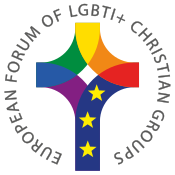“The time is ripe for faith communities to step up”
Sex and Gender and the World Council of Churches
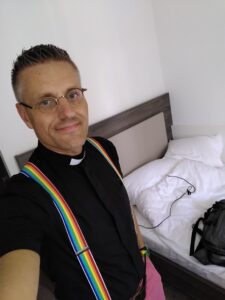
Wielie Elhorst (1969), LGBTI minister of the Protestant Church Amsterdam and involved in the advocacy work of the European Forum of LGBT Christian Groups, traveled to Karlsruhe, Germany to visit the General Assembly of the World Council of Churches in the trail of the Rainbow Pilgrims of Faith. He reports and shares just how rainbow the World Council of Churches actually is.
The moment I sit down to write this article, I receive an e-mail message with the devastating news I have received so often: a young man, who has found love in a partner, has for that reason to leave his family and his church, the community in which he grew up as a child. Tears burst from my eyes. Yes, I am tired after three days of World Council of Churches (how do people keep up who participate the whole week?!), but I am also sad and angry that apparently these things have to happen, inevitably and repeatedly. It dampens my enthusiasm about what happens on the stage of world ecumenism: the small, yet clear steps on the way towards more awareness around the theme “sexual orientation, gender (identity), and gender expression”.
The World Council of Churches
The World Council of Churches was founded in 1948 in Amsterdam (The Netherlands). Not only countries, also churches realised that an end had to come to all the division of which the two world wars were so clearly the result. Now in 2022, more than 350 churches are members of the World Council, representing millions of Christians all over the world. The World Council of Churches is like the United Nations. It comes together in a General Assembly every seven years. This time, Europe was the continent to come together, specifically Karlsruhe in Germany. Over 4,000 people celebrated together, ate together, came together in conversations, including those about sexuality and gender. It all happened from 30 August until 8 September.
I realised that is impossible to do one without the other and that, also in The Netherlands, people, organisations, and churches move at different speeds. Genuine change is not possible without growing awareness, and especially not without personal encounters. We still need a lot of that, before there can be an end to the injustice, many are still faced with because of their sex, sexual orientation, or gender identity. Of course, I feel this tension all the time: yes, sure, dialogue, conversations; a deeper understanding, but what about justice: equality for all women, all LGBTQIA people and an end to unsafety and exclusion?
Bringing Sexuality and Gender to the Fore
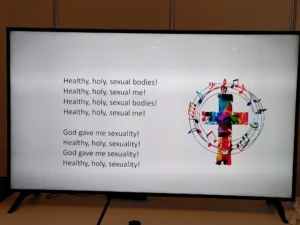
I can only praise all the work that has been done in the World Council of Churches in the last decade. During the last General Assembly of the World Council of Churches in 2013 in Busan (South Korea), it was decided to give more effort and resources to the topic of sexuality, because it was so widely and intensely debated. The Reference Group on Human Sexuality (RGHS) became the stage, on which representatives of member churches could talk about sexuality and gender—sexual orientation, gender identity, and gender expression included. These last topics were not made widely known in order to avoid traditional churches stepping out already at the beginning of the process. In Karlsruhe, the end result of the work of the RGHS was presented: “Conversations on the Pilgrim Way. Invitation to Journey Together on Matters of Human Sexuality”. One of the people I interview about this process and its result was Gabriele Mayer, the coordinator of the WCC Working Group of the European Forum of LGBT Christian Groups, and who played an important role in coordinating a Global Coalition of LGBT Christian organisations and their allies and in unofficially supporting some of the members of the RGHS.
Rainbow Pilgrims of Faith
In 1998 at the General Assembly of the World Council of Churches in Harare (Zimbabwe), LGBTI people of faith and their organisations were welcomed officially for the first time. A booth on the “market square” of the Assembly was what was possible for some organisations. From that meeting on LGBTI people of faith, their allies and their organisations have become increasingly visible in the meeting of the World Council of Churches until, in 2013 in Busan (South Korea), it was also possible to organiae a workshop. Sexuality was a hot topic at this Assembly and the space of the workshop was not big enough by far to contain all the people that wanted to listen to the stories of LGBTI people of faith present. With the installation of the Reference Group on Human Sexuality (RGHS), there was even more work to be done by the then-involved LGBTI organisations. Two members of these organisations were asked to become members of the RGHS as “experts”, others brought together a worldwide coalition of Christian LGBTI organisations and their allies to closely follow the work of the RGHS. The European Forum of LGBT Christian Groups has played an important coordinating role in bringing this coalition together. The 35 representatives, who were able to come to the General Assembly in Karlsruhe (Germany), where the work of the RGHS was to be presented, together formed the entity “Rainbow Pilgrims of Faith”. Next to an information booth, it was now also possible to organise around six panel discussions in a self-organised and official side event of the General Assembly.
Gabriele is happy with the document “Conversations on the Pilgrim Way” as the result of the work of the RGHS. However, she would have much preferred to see a document with political power as its result. Nonetheless, it has become a resource document that informs, lays out a broad theological framework and, it must be said, here and there also takes a stand. The document condemns all forms of violence against women and LGBTI people. As a resource document, it did not need to be voted on. Of course, this does benefit how the document will find its way into the member churches of the World Council of Churches overall—without the heated debates that maybe otherwise might have been the case.
Asking her what she is most happy about now that she has finally arrived at the General Assembly of the World Council of Churches in Karlsruhe, Gabriele first shares how satisfied she is with the number of people that have been able to come to Karlsruhe, the people that now together form the Rainbow Pilgrims of Faith and who are responsible for the panel discussions on LGBTI topics that take place in the Canisius House just a few hundred meters away from the Assembly grounds. This meeting is important to strengthen the bonds of the Global Coalition in the Rainbow Pilgrims of Faith that represent their organisations, together forming this alliance. Indeed, the work is not over after this Assembly and will need to be continually guided by the organisations that are now in this worldwide alliance. It has been at times stressful, because of all the cultural differences that the alliance has had to balance, but now the Global Coalition is there and it is a presence to be reckoned with. The WCC Working Group of the European Forum of LGBT Christian Groups took initiative coordinating, communicating, and facilitating. As its coordinator, Gabriele’s role cannot be overestimated. She and some others have been devoted to the process for more than 15 years.
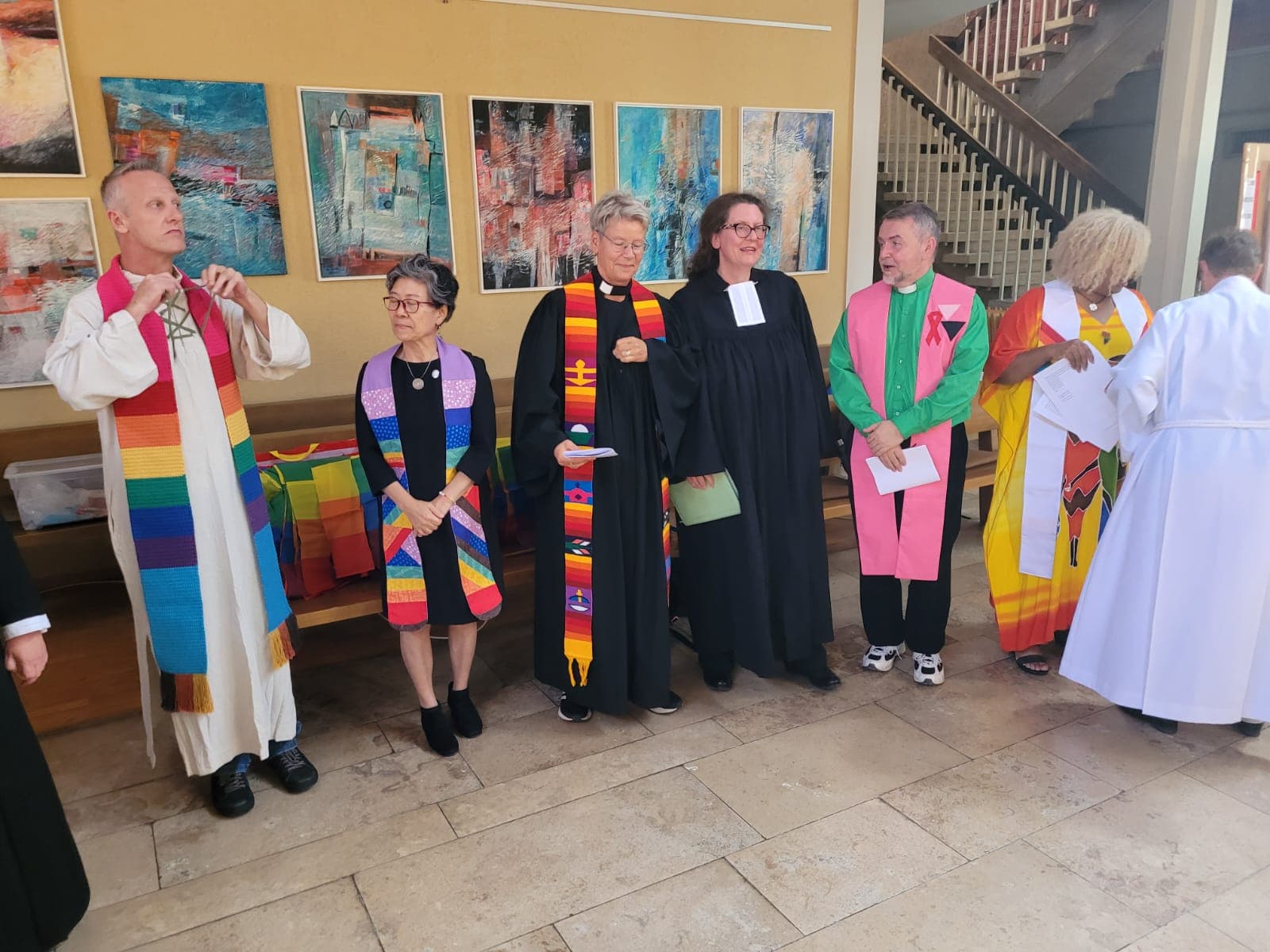

A Relationship Built on Trust
The process of putting gender and sexuality on the agenda of the World Council of Churces started way before the General Assembly in Busan (South Korea) where the installation of the RGHS took place. Slowly but surely, a podium was built, on which dialogue about sexuality and gender could take place, in the official arena of the World Council of Churches, but also in side events. The work grew exponentially when the work of the RGHS restarted. It was important to accompany the work of the RGHS, although in no way there was a formal relationship between organisations like the European Forum and the World Council of Churches.
WCC staff, however, were very friendly from the beginning and the WCC Working Group, were open and invested trust in the Global Coalition, were invited to visit WCC’s head office in Geneva (Switzerland) every year. As such, it was possible to come close to the work of the RGHS, with some of its members also belonging to the organisations bundled together in the Global Coalition. The relationship was a trusted one and found a good basis thanks to transparency from both sides. Still, it sometimes happened that members of the Central Committee, the highest governing body of the World Council of Churches, accused staff members of “involving themselves with advocacy groups”.
Publications to Be Proud of
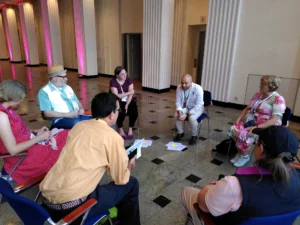
Fortunately, the relationship survived every accusation and crisis and instead a big positive difference in presence can be seen between the attendees of Busan and Karlsruhe: bigger, more diverse, intersectional, and richer in what it has to offer the churches coming together in the World Council. A new publication, of which Gabriele is very proud and that has already been translated from English into Russian, Korean, French, Spanish, Portugese, German, Indonesian, and Arabic, is “Reconciliation from the Margins: Personal Stories of Queer Persons of Faith”, showcasing 28 people from around the world. In the end, this of course is what this whole process is about: people—people made in the image of God, who want to participate fully and equally in church in society.
The Rainbow Pilgrims of Faith have not only published “Reconciliation from the Margins”. They also helped in printing “Conversations on the Pilgrim Way”. Only very late in the process was it decided to get hardcopies of the RGHS document as well. To make sure the document would get a wide audience, the Rainbow Pilgrims offered to also print a substantial amount. The offer was accepted.
Future Work for Rainbow Pilgrims
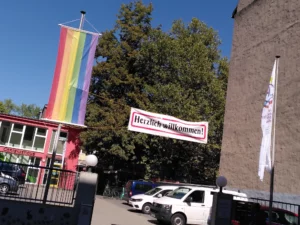
Although Gabriele is planning to step down soon from her role as the coordinator of the WCC Working Group of the European Forum of LGBT Christian Groups, she is confident about the future. Her confidence was not shamed. The day after our conversation, the decision was taken to not abandon the RGHS and let it continue its work. Even after a decade, its work has just begun. Gabriele hopes and expects that the document of the RGHS—over 80 pages long—will now finds its way into the churches. It is important that the people portrayed in “Reconciliation from the Margins” and all those others they represent will be acknowledged, that their stories will really be heard. Then next time perhaps, churches will see them as “theirs”—and sponsor those LGBTI members, who have to or want to be present at the General Assembly or whatever other event or meeting needs to be visited, to make the stories of LGBTI people visible, and, in the end, to improve their position and in many cases their lives.
Gabriele sees a new challenge in making the approach and strategy of the Rainbow Pilgrims of Faith more intersectional. In many cases, the struggle of LGBTI people coincides with that of women or with people of colour. And it is actually not really possible to speak about LGBTI people of faith without also addressing matters of peace and economy.
For now, the duty of the Rainbow Pilgrims of Faith is done. Gabriele’s time to rest has come. I, for one, am immensely proud of and humbled by the tremendous work she herself has done, as well as that of her LGBTI pack. They now go back to all corners of the earth, blessed and with the assurance that the Christian way more and more is truly becoming a pilgrim way: that is, a way on which people journey together, not leaving anyone behind because Christ never left anyone behind. With Michael Schuenemeyer, member of the RGHS and a Rainbow Pilgrim, I wholeheartedly say, “The time is [now] ripe for faith communities to step up.”
Wielie Elhorst, LGBTI minister of the Protestant Church of Amsterdam
